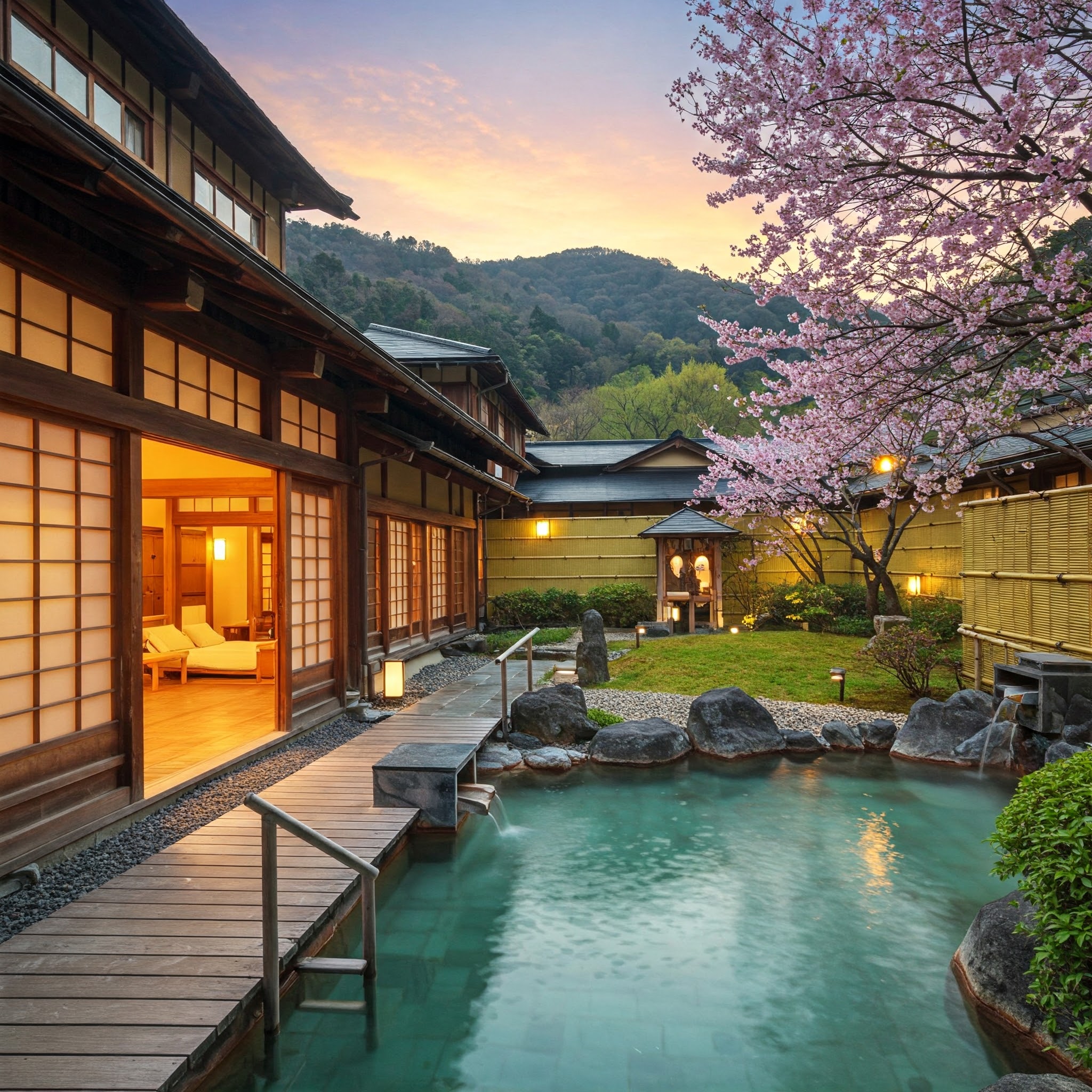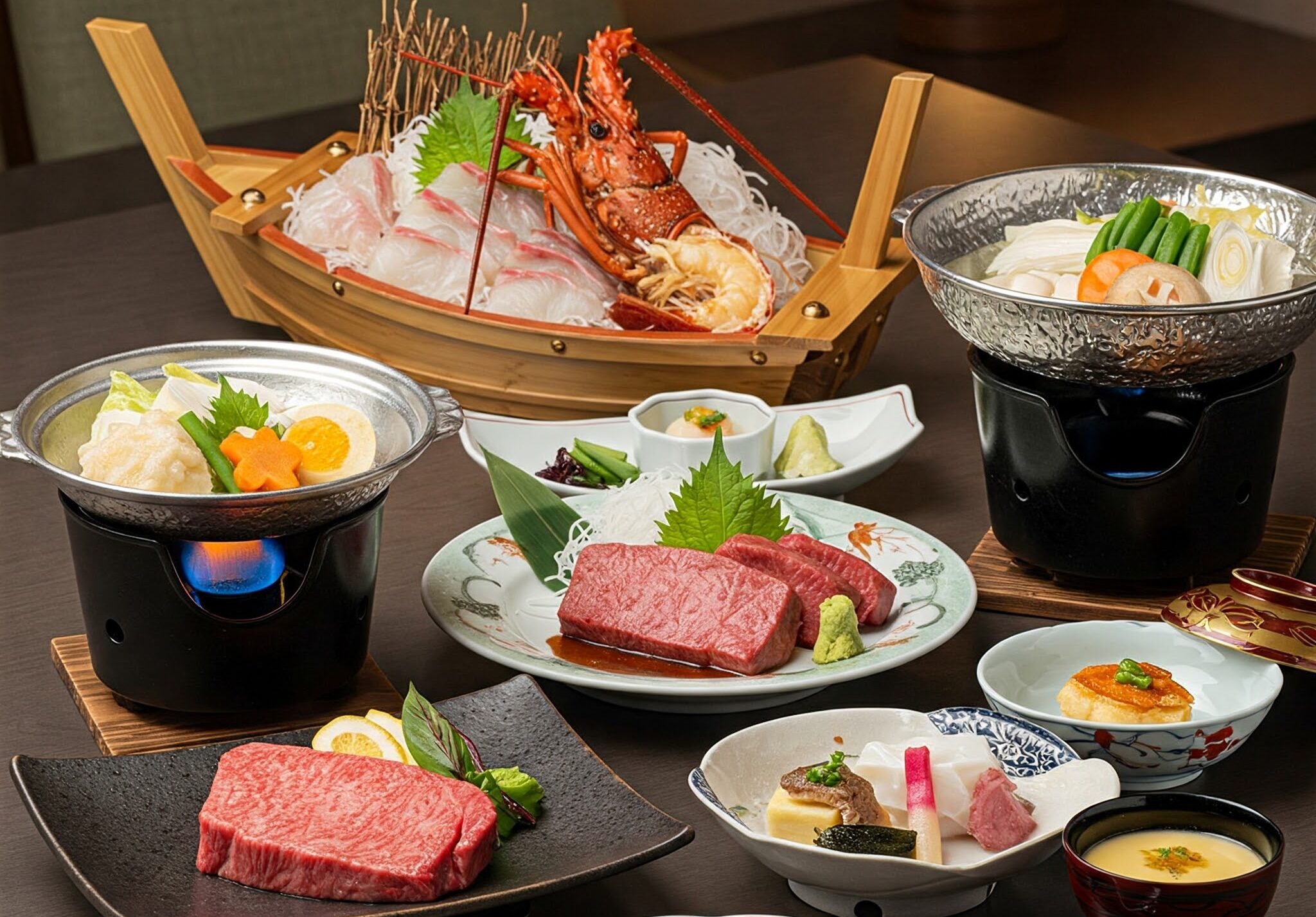What is a Ryokan (旅館)?
A ryokan is a traditional Japanese-style inn, characterized by tatami-matted rooms (Japanese straw matting). They offer a unique cultural experience, often featuring Japanese architecture, communal ofuro (large baths) and rotenburo (outdoor hot spring baths). Guests can relax in yukata (light cotton kimonos) and slippers within the inn. Ryokan stays typically include dinner and breakfast (usually a set course meal highlighting local specialties), and some offer in-room dining. Staying at a ryokan allows you to experience a traditional Japanese lifestyle, enjoy cultural traditions, and savor regional cuisine.
Things to Know Before You Enjoy Your Ryokan Stay
A stay at a ryokan is a luxurious experience unlike any other. However, it’s not just a “hotel”; it’s a place steeped in Japanese culture and history. For example, there are many rules and customs, like when the futon (bedding) is laid out in your room or how to conduct yourself in the dining area. Following these guidelines ensures a pleasant stay for you, other guests, and the staff.
Unknowingly breaking these manners can burden the ryokan staff or inconvenience other guests. This guide explains the “don’ts” in an easy-to-understand way. Use this as an opportunity to deepen your understanding of Japanese ryokan culture.
8 Things You Should Absolutely Avoid Doing at a Ryokan
Laying Out or Putting Away “Futon”
If this is your first time staying at a ryokan, you might be confused when you enter your room and don’t see a bed. Don’t worry! Sleeping on a futon laid out on the tatami floor is standard practice. Furthermore, laying out and putting away the futon is the job of the nakai-san (room attendant). Some people might think they’re being helpful by doing it themselves, or they might want to take a nap right away, but this stems from a lack of understanding of ryokan customs. The timing, order, and method of laying out and putting away the futon vary depending on the ryokan, and doing it yourself can disrupt their system.
Also, the act of “laying out the futon” is itself part of the ryokan’s omotenashi (hospitality). Therefore, unless you are specifically told it’s self-service, it’s best to leave it to the staff. If you are having dinner in the ryokan’s dining area, the nakai-san will usually lay out the futon while you are eating. If you are having dinner in your room, they will do it after you have finished. It’s a wonderful surprise to return to your room after enjoying your meal and find it transformed with the futon ready. Conversely, if the ryokan is self-service, you will be expected to follow the instructions and do it yourself.
Using Rolling Suitcases on Tatami Mats
Rolling a suitcase across tatami mats is a common mistake. However, the wheels can damage the tatami and leave dirt. At a ryokan, you should lift and carry your suitcase once you enter the room. Furthermore, the wheels can carry dirt and debris from outside, which can damage the delicate tatami. Tatami mats are a symbol of traditional Japanese culture. Treating them with care preserves the atmosphere of the ryokan and ensures a pleasant experience for future guests.
Taking Food from the Dining Area Back to Your Room
Enjoying meals at the ryokan’s dining area is an important part of the experience. However, taking leftover food back to your room is against the rules, even if you can’t finish it all. In particular, raw or undercooked food left at room temperature for extended periods can pose a risk of food poisoning. Ryokan meals are designed to be enjoyed at their freshest in the dining area. Taking food away can compromise the intended flavor and overall experience. If you’re concerned about leaving food, you can ask the staff beforehand if it’s possible to adjust the portion size.
Moving Furniture or Room Decorations
The furniture and décor in a ryokan room are carefully arranged to complement the overall design and functionality. Moving them without permission can disrupt the room’s ambiance and potentially cause damage or stains. For example, moving heavy tables or chairs to the window or rearranging large furniture should be avoided. If you have concerns about the furnishings or have a reason to move something, it’s best to consult with the ryokan staff first.
Taking Room Amenities Home
Ryokan rooms provide items like yukata, slippers, and towels, but these are generally intended for use within the ryokan. If there are amenities you are allowed to take home, the ryokan will inform you beforehand. Taking something you think is insignificant might actually be a valuable item to the ryokan, and you could be charged for it later. Follow the ryokan’s rules, and if you want something, ask if it’s available for purchase.
Ignoring Check-in and Check-out Times
Ryokans have strict check-in and check-out times to allow for cleaning and preparation. Ignoring these times can inconvenience the staff and the next guests. If you want to arrive early or stay late, it’s crucial to discuss this with the ryokan in advance. They may be able to accommodate you, but adhering to the designated times helps ensure smooth operations. Some ryokans offer early check-in or late check-out, but these often come with an additional fee, so be sure to check.
Breaking Bathing Etiquette
Japanese bathhouses have various rules. Common rules include washing your body (or rinsing with hot water) before entering the bath and wiping your body with a towel before returning to the changing room. These are general rules common to many public baths, and the baths in ryokans are no exception. These bathhouse rules are in place to ensure that all guests can use the baths comfortably. Some ryokans may have additional, specific rules, so it’s recommended to check what rules are in place before using the bath. Also, people with tattoos may be denied entry to the bath. This is largely due to the historical association of tattoos with the yakuza (Japanese organized crime). However, an increasing number of ryokans are becoming tattoo-friendly. Some ryokans also offer private baths (kashikiri-buro), which can be a good option.
Making Unreasonable Demands of the Ryokan Staff
Ryokan staff work hard to ensure a comfortable stay for all guests. However, making unreasonable demands, such as requesting service late at night or outside of operating hours, or insisting on your own preferences, should be avoided. This can compromise the overall quality of service. For example, requests like “make a dish that’s not on the menu” or “I want to use the hot spring outside of operating hours” are usually difficult to accommodate. If you have a concern, talk to the staff first and be respectful of the ryokan’s rules and circumstances. However, if you have dietary restrictions or allergies, it’s best to inform the ryokan when making your reservation, and they will usually be able to accommodate you.
Making Your Ryokan Stay Even Better
Staying at a ryokan is a wonderful opportunity to escape the everyday and enjoy a special experience. By being considerate of others and the ryokan’s rules, you create a pleasant atmosphere for yourself and other guests. The ryokan staff also strives to ensure that every guest has a comfortable stay.
Ryokan culture is more than just a place to stay; it’s a chance to experience Japanese history and customs. During your stay, be sure to appreciate the staff and the facilities, and practice proper Japanese etiquette. This will undoubtedly make your stay even more enjoyable and enriching.



コメント